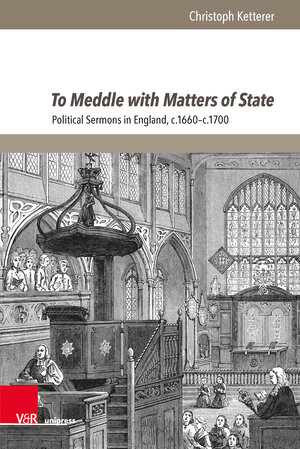Die Studie analysiert die politische Dimension protestantischer und römisch-katholischer Predigten an den Höfen von Karl II. (1660–1685) und Jakob II. (1685–1688/89), vor dem englischen Parlament und in den Kirchen Londons. Vor dem Hintergrund ungelöster politischer und konfessioneller Spannungen nach der Restauration, suchten Predigten mit Kritik an Machthabern und deren Beratung, Einfluss auf den religiösen und politischen Diskurs zu nehmen. Das Verhältnis von geistlicher und weltlicher Macht sowie der Umgang mit der multikonfessionellen Situation in England sind dabei zentrale Themen. Das Vorhandensein einer differenzierten Rezeptionskultur, für die Predigten als einmalige Aufführung und als Texte bedeutsam waren, zeigt die fortbestehende Wichtigkeit der Predigt in der Restauration.
In this volume Christoph Ketterer analyses political preaching during the reigns of Charles II (1660–1685) and James II (1685–1688/89). He argues that the political importance of sermons preached at court, before Parliament and in the churches of London, is based on the unsolved political, and confessional tensions of the era. Preachers relatively freely discussed questions of religious tolerance, models of political power, and could offer counsel and criticism to those in power. They were in a position to influence the political and religious discourse of Restoration England. In addition, a refined culture of reception existed, and listeners, readers as well as preachers were acutely aware of the sermon genre’s performative dimension. Sermons therefore continued to be of central importance for the political and religious discourse of the Restoration.
In this volume Christoph Ketterer analyses political preaching during the reigns of Charles II (1660–1685) and James II (1685–1688/89). He argues that the political importance of sermons preached at court, before Parliament and in the churches of London, is based on the unsolved political, and confessional tensions of the era. Preachers relatively freely discussed questions of religious tolerance, models of political power, and could offer counsel and criticism to those in power. They were in a position to influence the political and religious discourse of Restoration England. In addition, a refined culture of reception existed, and listeners, readers as well as preachers were acutely aware of the sermon genre’s performative dimension. Sermons therefore continued to be of central importance for the political and religious discourse of the Restoration.








